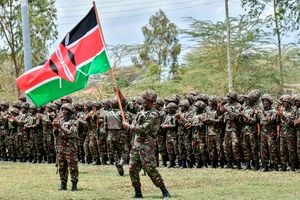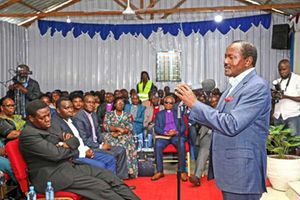Defying setbacks to become TB, HIV treatment champion

Ms Janet Were, a TB survivor and health advocate narrates her experience during a Media Science Café organised by the Media for Environment, Science, Health and Agriculture (MESHA) in a Nairobi Hotel on November 2, 2023.
What you need to know:
- While in the hospital, I had a CT scan and was diagnosed with meningitis.
- I began meningitis treatment while I was in the hospital. My condition had deteriorated to the point where I was fighting everyone around me, including doctors. I was chained to calm myself down.
Janet Were was orphaned at the age of seven. She dropped out of high school after her uncle, who was paying her school fees, died. Her relative then married her off. The mother of three was later diagnosed with HIV, tuberculosis, and meningitis. She even lost her sight as a result of medicines she was taking for multiple diseases.
The last born in a family of five claims to have suffered a mental breakdown and was away from her twin babies for almost a year while in hospital. She is now an advocate for tuberculosis and HIV treatment in Nairobi’s Mathare slums. Below, she shares her story.
“When I went to the antenatal clinic, I discovered I had HIV. I was married off at the age of 17 to an older man who was about 38 years old at the time. I was pregnant when I found out that I had HIV. I began taking my ARV drugs right away because I needed to protect my unborn babies. I adhered to my medication well, thanks to the advice of doctors and a support group I belonged to.
However, family problems later made me lose my self-esteem. I felt I wasn’t worth living. I felt that I needed to die because I didn’t even have anyone to share my pain with. At the time, none of my relatives were visible, and I told myself that the marriage plan was to throw me into the lion’s den. So, I stopped taking my medicines.
I even went to the hospital and stated that I did not want to continue taking my medication, making it difficult for health officials who were attempting to locate me. I stopped answering their calls and later changed my phone number because I didn’t want them to contact me. I defaulted for almost a year. Then I started having severe headaches. I was taking painkillers but they didn’t help.
One day, I fainted and was later admitted at the Kenyatta National Hospital. I was placed on oxygen.
While in the hospital, I had a CT scan and was diagnosed with meningitis. I began meningitis treatment while I was in the hospital. My condition had deteriorated to the point where I was fighting everyone around me, including doctors. I was chained to calm myself down.
As I was undergoing meningitis treatment, I began coughing and experiencing chest pains. Doctors performed a TB test after noticing that I occasionally spit blood. They discovered that I had TB. When my relatives arrived at the hospital where I was admitted and saw my situation, they told me, ‘When you die, we won’t lack a place to bury you.’ That’s how they abandoned me.
Loneliness was the other illness. When you’re in the hospital alone, you feel like you’ve lost it all. So, when representatives from the Aids Self-care Foundation Kenya came across my bed while they were going around, I knew I’d been through a lot on my own and was in a dark world since I’d lost my sight. After I told them my story, they empathised with me, paid my hospital bill, and requested my transfer, which was on my eighth month in the hospital, and took care of me while I continued with my TB and meningitis treatments.
When my mental state improved, I remembered my children and began screaming that I wanted them. They were brought to me. We could finally see each other after nine months. During that time, I got transferred to a private ward with my children beside me. I was also assigned a private nurse to take care of my babies, and just seeing them made me feel better. It gave me another reason to live.
I realised that my death would have meant abandoning not only myself but also my children, who would have suffered as a result of my death. I continued with my treatment for six months before being cured of tuberculosis and meningitis. However, my sight suffered. Even with spectacles, I still can’t see well. Light bothers me. Also, I can’t carry heavy loads on my head.
Due to issues at home, I later separated with my husband and went with the children. During that time, my neighbours became my friends and helped me with food and rent. I lived alone with my children for five years and took my medicines as directed. As a result, my status is now ‘Undetectable = Untransmittable’.
I am one of the 15 members of Advocates of Hope for Community, a community-based organisation based in Mathare, where I am a TB and HIV treatment advocate because so many people face discrimination and stigma.”





